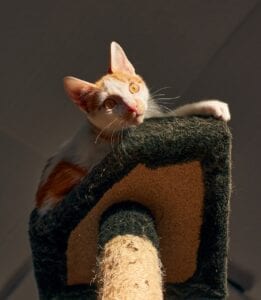On This Page
- How to Know if Cats Are Playing or Fighting
- How to Stop Cats Fighting
- Why do cats fight?
- What do you do if your cats are fighting?
- What do you do if another cat is fighting yours?
- Fighting or Playing? How can you tell?
- Signs That Show If My Cat Is Playing or Fighting
- Signs Your Cats Are Playing or Fighting
- Cats Playing or Fighting With Humans
- Understanding Cat Play and Fighting Behavior
- Playful Biting and Scratching
How to Know if Cats Are Playing or Fighting
Do you have two cats that aren’t getting along? there could be a multitude of reasons why your cats are fighting, and you need to find out why it’s happening before you can solve the problem.
I will explain the various reasons why some cats don’t get along with each other and offer solutions to help you bring peace to your household. Note
all cat fights are not the same. Sometimes what looks like a cat fight may actually be normal playing. This is more common with younger cats, but it can happen at any age. Cats will chase each other around the house, tackle each other, and fight like little wrestlers on the floor. It can sometimes get pretty intense, but, as long as they’re not crying out in pain, there’s no need to break them up.
Aggression: some cats can be aggressive by nature. Male cats are especially aggressive and these cats keep fighting. Sometimes, they also dominate female cats. Your cat may need to act out their aggression by picking fights with their brothers and sisters or by causing a fight with a strange cat. Rough play: sometimes cats can be playing and it can get rough. Cats are rough when they play – this may look like aggression and fighting, but it is not. Still, such play could escalate into a fight or cause harm to both or one of the cats. In such cases, it is best to separate your cats if you can do so safely.
What does it mean if my cat is staying up late at night?
have you ever wondered if your cat was secretly fighting crime at night? most cats walk, play, and eat during the night. This is normal, as cats are inherently nocturnal. But if you’re a light sleeper, this can become a problem. To encourage your cat to sleep throughout the night, you can try to tire them out as much as possible during the day. Enrich your cat’s life by playing with them and keep them stimulated with scratching posts, cat trees, and food puzzles filled with low-calorie cat treats !.
How to Stop Cats Fighting
Sometimes, when your cat is wandering outside, they could be attacked by another cat. These attacks can be systematic: owners have stories of a single cat that keeps fighting their cat every time they go outside.
This is especially worrying if your cat is mild-mannered and gentle, and is unlikely to fight back. The injuries from these fights can require several trips to the vet and can be worrying. The best solution for how to stop cats from fighting in this situation is to keep your cat indoors. Letting them out after dark can be especially dangerous.
Cats screaming while playing
You need to show your feminine yet playful side. A dream of cats is a link to your feminine side and is associated with females. 4 years ago. It’s something that benefits cats, starting in kittenhood and extending all the way through the geriatric years. 3. Heather started walking dogs in 2006 while completing her master’s degree in education. These are very audible indications that your cat may be unhappy. Newport your cat’s lack of eating can also be a symptom of a disease or problem that’s causing pain or discomfort. There are about 100 different cat noises, which our feline friends mix and match to talk to us.
Cats fight over territory more than anything else. Even if you moved into a new, bigger house, the pair would still fight; so what can you do?
as it turns out, you have a few options. One is to provide both cats with their own small space. That means giving each cat its own bed in its own part of the house. The more each cat sleeps in its own bed, the more its pheromonal scent congregates there, giving it its own distinct part of the home. This may not work since cats don’t always use the beds we buy for them, but if they do, then this may be enough to stop the pair fighting.
Why do cats fight?
Playing with your cat provides numerous benefits; it fights obesity , limits boredom , and solves cat behavior problems. Besides, many cat owners claim that playing with their cats is fun if the cat plays along, that is. Unfortunately, not all cats are equally enthusiastic about playing. Some cats love to follow toys with their gaze but never jump on them. Some do play, but only on tuesdays, while others do not really seem to care at all. In this article, you will learn how to get a lazy cat to play with toys.
Watching your cats fighting can be heart-breaking; here are two animals that you adore and they are hurting each other! while your first instinct might be to jump in and separate them, do be careful. Cats can be aggressive they are worked up like this, and you may get a lot of scratches for your efforts. We suggest trying to gently separate them, as long as you are sure you are not in harms way.
Cat vocalizations have been categorized according to a range of characteristics. Originally suggested by mildred moelk, cat sounds are often still divided into the three main classes
Sounds produced with the mouth closed, the murmurs (purring, trilling)
Sounds produced when the mouth is first opened and then gradually closed (meowing, howling, yowling)
Sounds produced with the mouth held tensely open in the same position (growls, snarls, hisses, spits, chattering, and chirping). In 1944, moelk published the first phonetic study of cat sounds. She listened very carefully to her own cats and organized their sounds into 16 phonetic patterns divided into three main categories. She also used a phonetic alphabet to transcribe or write down the different sounds. She claimed cats had six different forms of meows, to represent friendliness, confidence, dissatisfaction, anger, fear and pain.

What do you do if your cats are fighting?
If your cats are still in the getting-to-know-each-other phase (the first few months after a new cat has been brought into the home) and are doing the kind of play fighting described above, don’t worry. They’re probably battling for the alpha cat position in the household. This happened with my two cats after they met. The play fighting went on for about two or three months. They had a good fight almost every day. Gradually, that tapered off, and they began getting along much better.
There are also other ways as to how to stop cats from fighting:
if distraction doesn’t work, another gentle but effective way to stop a fight is to use a water spray bottle to emit a fine mist of water. This will help them to pause for thought without being too scary. The most important thing to remember when stepping in to halt the fighting is: don’t get hurt and don’t make you cat(s) more stressed/scared with the techniques used. So don’t be aggressive towards your cat, and don’t use heavy-handed techniques.
In 1944, moelk published the first phonetic study of cat sounds. She listened very carefully to her own cats and organized their sounds into 16 phonetic patterns divided into three main categories. She also used a phonetic alphabet to transcribe or write down the different sounds. She claimed cats had six different forms of meows, to represent friendliness, confidence, dissatisfaction, anger, fear and pain. Moelk classified eight other sounds involved in mating and fighting by listening to the animals in her yard and on the street.
What do you do if another cat is fighting yours?
Although cat biting will often just be a warning nip or over-excited play, it can sometimes become an expression of aggression. Biting during play is fairly easy to distinguish from aggressive behaviour these little nips won’t cause much damage, and are over quickly. Aggressive cat biting is accompanied by other signs that your cat is in a fighting mode, whether this is directed towards a person or another animal.
If your cat keeps fighting, whether with other cats in your house or with strange cats from the neighbourhood, you may need a more permanent solution. A cat that always gets into fights may be suffering from excess aggression or they may simply have poor socialisation skills. Here are some leads on how to help your cat for the long term. Cats often fight because they have excess aggression. This aggression can be a symptom of an illness that you are not aware of. Take them to the vet and get them checked out. Your vet will be able to advise you on how to proceed.
Redirected aggression occurs when a human attempts to handle a cat that is aroused by something unrelated to the person, e. g. The dog has been chasing the cat or the cat is fighting with another cat. Typically, redirected aggression starts when a cat sees another cat outside or smells another cat and becomes aggressive (territorial aggression), but can’t directly interact with the outside cat. She will then redirect the aggression to another cat in the household or a person.
Fighting or Playing? How can you tell?
Make sure each cat has plenty of his or her own space. This means putting their food and water bowls, litter boxes, and beds in separate areas. Have plenty of their favorite cat toys around to distract them from fighting. Make the time they spend together as pleasant as possible. Encourage fun activities, such as playing or giving each one a treat.
The following post was originally written by fellow cat veterinarian dr. Colleen currigan of cat hospital of chicago. How about in your household? are your cats fighting or playing?
Even when it is not necessarily perceived as problematic, it is quite common to hear cat owners casually comment that my cats fight all the time. But are they really fighting or are they simply just playing?.
You need to show your feminine yet playful side. A dream of cats is a link to your feminine side and is associated with females. It’s something that benefits cats, starting in kittenhood and extending all the way through the geriatric years. Heather started walking dogs in 2006 while completing her master’s degree in education. These are very audible indications that your cat may be unhappy. Newport your cat’s lack of eating can also be a symptom of a disease or problem that’s causing pain or discomfort. There are about 100 different cat noises, which our feline friends mix and match to talk to us. Just some random video that wasn’t on youtube during the time.
Signs That Show If My Cat Is Playing or Fighting
Watching a pair of cats playing with each other and wrestling can be truly adorable. However, if you’re not used to cat behavior, it’s possible to miss the signs that this play fighting may be less than friendly and you need to intervene.
One of the biggest mistakes a pet owner can make is to assume that when one animal is ready to play, the other is too. Playing is an important way for alliances and socialization to take place for cats and dogs, but both animals have to be willing to take part. For example, you might have a kitten who just wants to play with an older dog, a great sign from your cat, but if your dog shows any signs of frustration or tries to get away and cannot, this can lead to some problem confrontations. The reverse is equally as true.
The same types of behavior cues for two cats or kittens fighting or playing can also be used when it’s a human and a cat in the equation. If your cat has loose, relaxed body language with fur laying normally against his body and he is not hissing or growling, he is likely having a good time playing with you. On the other hand, if his body language is stiff, he is showing teeth and claws and growling and his fur is standing up along his back, this is a cat that is not happy with you and may become more aggressive if the situation is not addressed.

Signs Your Cats Are Playing or Fighting
Associated applied animal behaviorist katenna jones says that sound is a good way to tell if cats are playing or fighting. if it’s quiet, it’s most likely play. If there’s growling, it’s most likely not. if there is nothing other than the occasional meow or chirp, this means your cats are probably having fun. If you hear more stressed or aggressive sounds like yowls, hissing or screaming, you definitely have a fight on your hands.
The tired old saying, fighting like cats and dogs tends to be rooted in fact. After all, where there’s smoke, there’s fire, right? yet, we have also seen examples of a dog cat kinship that is as tender and loving as any friendship. The most recent statistics from the american veterinary medical association report that 44 per cent of U.S. Pet owners have multiple-pet households, and the most common combinations include dogs and cats in the mix. Since this combination is the most likely, it’s important to know how to handle the situation if the family pets aren’t playing well together.
Another clear sign cats are playing is that they will take turns being the lead in wrestling or chasing games. They may also separate for a few seconds and then start up again. If you notice during play that one cat is always the chaser and wrestler, this may be a sign of concern, but if the other cat seems willing to engage then just keep an eye on them to make sure both cats are having fun. You know when cats are fighting because a cat that is involved in a fight will either continue fighting to defend itself or attempt to run away and hide to get free of the more aggressive cat.
Cats Playing or Fighting With Humans
Finally, it is very unlikely that two cats that do not know each other will play with each other. It’s normal for cats within the same social group to enjoy playing but a cat is more likely to treat a cat new to them as a threat and at the very least get away from it, if not engage in fighting. Even a cat brand new to the household will be treated this way.
Especially if you have just adopted your cat, they may need time to settle in before they start playing. If the cat has not socialized well as a kitten, they may be fearful of the home, other pets, or humans. If this is the case, your cat may need extra time to warm up to their new environment. Cats may stop playing if there is a change in their environment. This includes moving to a new home, new pet, new child, or even moving furniture around. Cats are very sensitive to their environment and will need to acclimate after any major changes.
The kids scream all day long while playing in their blow up pool and their cats are using my flower beds as their personal litter box. If your cat is accidentally locked in a closet or other area that he can’t find his way out of, he may scream.
Understanding Cat Play and Fighting Behavior
It’s perfectly normal to see cats tussling around your floor or chasing each other along the furniture and up a cat tree. Playtime is a healthy behavior for kittens and adult cats. Normal play behavior can include cats wrestling with each other, chasing each other and appearing to jump and attack each other, all of which are natural hunting behaviors expressed for sheer enjoyment. However sometimes play can escalate if one or both cats become over stimulated, or startled or you may see two cats fighting where it’s clear they were aggressive with each other from the start.
Now that you’ve gained a better understanding of what a fighting cat looks like, let’s look at what a playing cat looks like. As you’ll see, there are many overlaps between the two, but there are also distinct differences. As with a fighting cat, it’s a combination of these that indicate when a cat is playing.
Playful Biting and Scratching
The junior stage ranges from 6 months to 2 years. At this stage, behavior often shifts from playful exploration to aggressive boundary testing. This age is where your cat begins to reach sexual maturity. It is important to engage your cat in mental and physical enrichment and play. Invest in toys that stimulate and help their primal instincts of hunting and stalking. Although you will want to use your hands or feet as a ‘toy’ it is important not to encourage scratching and biting. As your cat grows, it will assume this is appropriate play behavior.
When kittens are still in their litter, they love a rough and tumble with their siblings it is their way of socialising, playing and testing boundaries, but it can involve playful biting and scratching, as they learn not to hurt each other. If they play with us this way though it can be painful on human hands and fingers!
for this reason, although this play behaviour is natural between kittens, it should be discouraged before your cute kitty gets older and their bite gets stronger and more painful!.
A biting and scratching bengal can seem quite aggressive at first, even if they’re playing. When a muscular, wild-looking cat comes running at you, it’s naturally very intimidating. However, bengal cats are not as aggressive as they may seem. They’re not any more aggressive than your average house cat. Bengals are known to be sweet, loving creatures. As a breed, bengal cats need vigorous exercise and frequent human interaction. As they are usually friendly, social, and playful, they will want to play with you how they play with other cats claws and all.
If you have been using your hands to play with your cat, you may want to switch to another style, as cats can become overstimulated by our actions. When cats become overstimulated, they typically act in a defensive manner by swatting or biting. Try a string teaser type of toy, instead of your hands. If you are playing with a string toy, try to mimic how the cat’s prey would move. Create scurrying and stop behaviors of a mouse or simulate flying and landing like a bird. Play around with the speed and how long the “hunt” is before they catch it.
If your cat is biting you during play, avoid punishing the cat as this will only make your cat fearful of you and possibly aggressive. Calmly move the cat off by distracting them with a toy or a treat. Wand toys that move the cat further away from your hands are perfect for this task. Reward the cat for moving away from your hands with whatever he enjoys most such as treats, play or a brushing. Never pull your hands away from a cat that is play biting as this may overstimulate him and cause him to either bite and scratch more or bite down harder. Remember that your cat hasn’t learned to play properly and it’s your job to teach him gently what will give him rewards and which behaviors will not.
One of the most common types of aggression is play aggression. Vigorous play in cats is part of normal cat behaviour. These cats are usually young, energetic cats living as single cats in a household and sometimes have a history of being taken early from their mother and siblings. Often, owners contribute to the problem by playing roughly with the cat when it is a little kitten, rewarding it for biting and clawing by continuing the play.
The post Are Cats Playing Or Fighting appeared first on Catnip Utopia.
The post Are Cats Playing Or Fighting appeared first on GQ Central.
The post Are Cats Playing Or Fighting appeared first on Local SEO Resources.














 Google confirms that passage rankings will look just like riche snippets
Google confirms that passage rankings will look just like riche snippets
















 Core Update Complete
Core Update Complete
 New Deals Daily
New Deals Daily 













